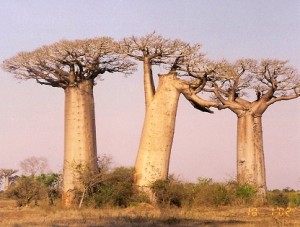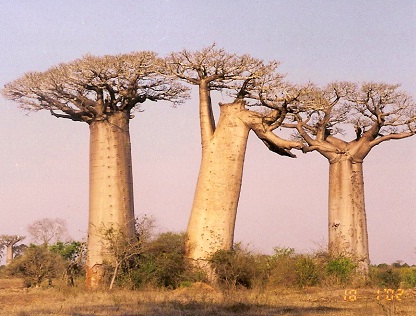Politics and the Environment:Reflections on the United States vs. Madagascar – by Dan Turk

In Madagascar my family and I have enjoyed tremendously the chance to visit some of the island continent’s incredible nature reserves and see some of its amazing biodiversity like lemurs and fosas and baobabs. As I drive around the southeastern US visiting churches on interpretation assignment for the Presbyterian Church (USA), my thoughts often turn to the environment and its politics here in the US compared with Madagascar.
Native Trees in the Landscape
One of the most striking differences between the US and Madagascar concerns trees in the landscape. Almost everywhere in the southeastern United States, whether along highways, in cities, or in the countryside, there are trees. There are now more trees in much of the eastern US, especially the NE, than 100 years ago[1]. Most of the trees in the landscape are native to this part of the world like oaks, pines, maples, hickories, and dogwoods. Along with the trees are numerous native animals, like deer, raccoons, and opossums, whose abundant remains along our highways testify to thriving populations.
When traveling in Madagascar I see much less native forest, and far fewer native animals. Most of the forests that once covered Madagascar have long since disappeared, leaving vast deforested areas of grassland, with extreme erosion, and dwindling remnants of native forest. This prompted US Astronaut John Grunsfeld, who went to space five times, to say “Looking down on Madagascar, I have watched what little forest there was shrink to several tiny preserves.” Trees that have been planted or have grown back in deforested areas are most often not native, like fast-growing eucalyptus trees from Australia and weeping pines from Mexico.
The reason for the difference has a lot to do with the relative degree of prosperity. After the European colonization, the extensive forests in the eastern US were systematically cut down for wood and conversion to agricultural fields. Since then, as the center of agriculture shifted westward and people for the most part quit cooking their meals and heating their homes with firewood, and quit using trees for fertilizer (yes, slash-and-burn agriculture was practiced in the US), the trees have grown back.
By contrast, in Madagascar where most people live on less that $ 1 per day, most people still rely on firewood and charcoal to cook their meals. As investment in purchased fertilizer is a risky proposition (no government subsidies for agriculture as in the US) and most people don’t have money to invest in fertilizer anyway, slash-and-burn agriculture is still widely practiced, resulting in widespread deforestation. When a person needs firewood for fuel or income, it doesn’t work to plant a relatively slow-growing native tree when more wood and more money could be obtained by growing some of the world’s champion fast-growing trees, like eucalyptus and pines. In fact, if it were not for extensive planted eucalypt forests that supply much of the charcoal used by Madagascar’s urban population, much less native forest would remain. It is usually much more expensive to reestablish native forests by planting and protecting native trees compared with spending limited resources to protect existing native forests. As a result of all this, deforestation continues at a rapid pace and most reforestation is with non-native trees.
Environmental Politics

In the US, there has been an environmental awakening over the past 50 years. Sparked by Rachel Carson’s Silent Spring and other early environmental efforts, numerous interest groups actively lobby our government to help preserve the environment. Huntinggroups want places to hunt and wildlife groups want to preserve endangered speci
es. There is a lively political debate as to the relative benefits of saving old-growth forest versus creating jobs and of getting oil from certain places versus avoiding pollution and preserving wilderness areas. For all the screaming and posturing, our government’s checks and balances and the active participation of a wide range of citizens and citizen groups, help the government make decisions and compromises that have in many ways worked to help preserve natural environments.
In Madagascar as in much of Africa, good governance is a nebulous concept. In many places government officials are more involved in exploiting the environment than preserving it. For example, a recent report[2] about trafficking in rosewood and other precious woods uncovered evidence “clearly demonstrating state-sanctioned laundering of illegal wood”. In Madagascar few citizen groups are engaged in promoting environmental protection. Laws against slash-and-burn agriculture are rarely enforced. In any case, saving a lemur versus feeding a child is a tough sell.
Eco-tourism is certainly helping the situation, and revenues from tourism do provide an important incentive for preserving biodiversity in Madagascar. But only a small number of reserves get large numbers of tourists and many remote protected areas get almost no visitors. Due to high-priced air tickets, for many Madagascar is an expensive tourist destination, severely limiting the number of tourists who come. Nevertheless there is something of an environmental awakening going on in Madagascar, promoted by the benefits of tourism and the efforts of international non-governmental organizations. Unfortunately, though, poverty is an overwhelming reality that limits the effectiveness of efforts to promote good environmental policies, and contributes to corruption.
Our Role as Christians
As Christians, our call to preserve Creation is inherent in the Creation itself: God saw that it was good, so who are we to destroy it?
I worry that future generations may look back at ours and see missed opportunity to save countless plants and animals from extinction.
Some years ago I heard prominent conservationist George Schaller, who studied gorillas in the Congo and lions in the Serengeti before working with the Chinese to help save the panda, say on the radio that he considers himself an environmental missionary. The concept fascinated me then and continues to do so.
Shouldn’t we all be environmental missionaries? How can we as a church and we as individuals work more effectively to help save Creation? How do we strike a balance between working to save Creation and alleviating human suffering? Clearly there is a lot that we could be doing.
[1] See Prevailing Myths About Agricultural Abandonment and Forest Regrowth in the United States.
[2] Investigation Into the Global Trade in Malagasy Precious Woods: Rosewood, Ebony and Pallisander. Global Witness and Environmental Investigation Agency (US). October 2010.


You are quite right when you said that “few citizen groups are engaged in promoting environmental protection.” It is so because most people are uneducated and poor, the regime is corrupt. I think missionaries should not only teach christianity in the countries they are sent to. They should also take part in the protection of the environment.